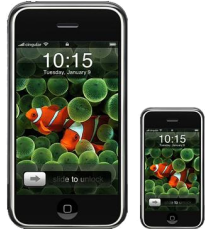'iPhone nano' could swamp the mobile market; kill off rivals


iPhones are expensive, but arguably proportionate in price for what they can do. Arguably, both the iPhone and the BlackBerry devices are ruling the marketshare at present for their ability to do practically anything.
"The new smaller iPhone is expected to priced cheap enough to be offered by carriers for free with a smaller subsidy, or in the ballpark of $300 unlocked. Rather than being a dumbed down 'feature phone,' the smaller iPhone is said to simply be "significantly lighter," with a smaller edge-to-edge touch screen."
The 'cheaper iPhone' could be sold to carriers at half the existing price of the regular iPhone, meaning greater subsidies to the end consumer. It could in effect also be an emerging handset for those in less economically developed areas of the world.
Though the partnership of Microsoft and Nokia to provide Nokia touch-handsets running Windows Phone 7 may not be able to take on the iPhone demographic, it is more aimed at attempting to knock a few chips away from Android.
But if Apple's iPhone is already a dominating force in the mobile market, a less expensive iPhone-like device could put other mobile manufacturers out of business. Who would want a cheap Nokia phone at $99 when they could easily jump aboard the iPhone bandwagon and claim the social status for around about the same price?
The Generation Y is all about the iPhone. While it is clear on the ground that the standalone portable music player is not as important as an iPod combined with mobile calling technology, the iPhone still takes the top place as the contender of choice for younger consumers.